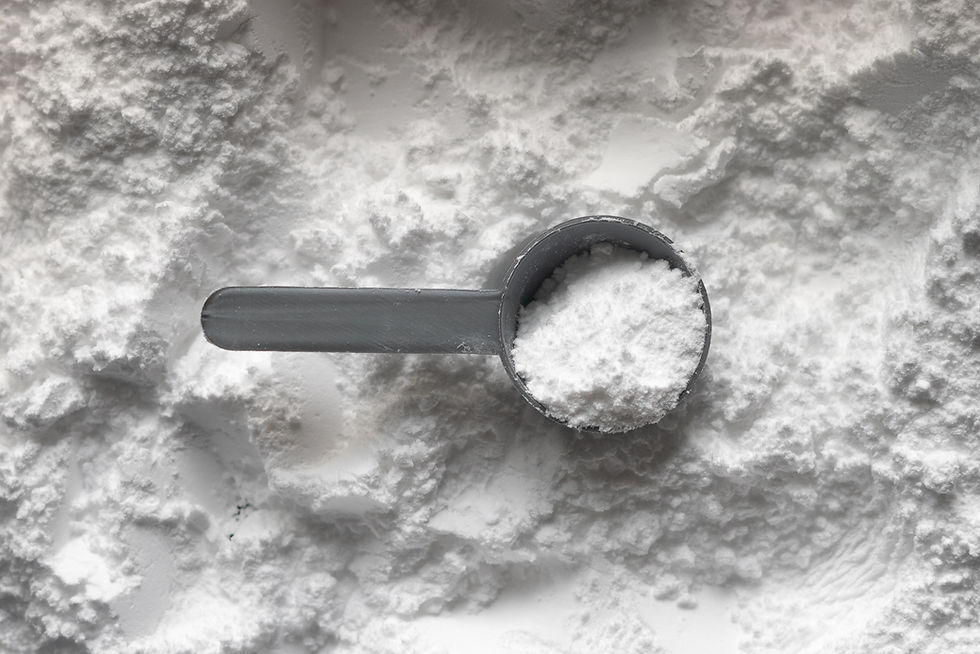The Surprising Benefits of Creatine: How It Can Benefit Your Mental Health and Fitness Goals
- Gary Roth

- Jan 6, 2023
- 3 min read

Creatine is a natural substance that is found in the human body and also in certain foods such as meat and fish. It is classified as a dietary supplement and is commonly used by athletes, bodybuilders, and people looking to improve their athletic performance.
There is a significant amount of scientific evidence to support the use of creatine as a supplement. In this blog post, we will explore the benefits of creatine and how it can improve athletic performance, as well as its potential benefits for brain health and disease treatment.
One of the primary benefits of creatine is its ability to improve athletic performance. Creatine is stored in the muscles in the form of phosphocreatine and is used to produce energy during high-intensity exercise. Supplementing with creatine has been shown to increase the body's phosphocreatine stores, which can then be used to produce ATP (adenosine triphosphate), the primary energy source for muscle contractions. This can lead to improved muscle strength and power, as well as increased muscle mass.
In a review of over 50 studies, researchers found that creatine supplementation was effective in increasing muscle strength by 8% on average, with some studies showing an increase of up to 14%. It was also found to increase muscle mass by 2 kg on average, with some studies showing an increase of up to 5 kg. These improvements in muscle strength and mass can lead to improved athletic performance, particularly in activities that require short bursts of high-intensity activity such as sprinting, weightlifting, and team sports.
In addition to its effects on muscle strength and mass, creatine has also been found to improve endurance performance. In a study of 35 male and female runners, supplementation with creatine for seven days was found to increase time to exhaustion by 18%. Other studies have found similar improvements in cycling and swimming performance.
Creatine may also have potential benefits for brain health. Creatine is involved in the production of neurotransmitters, chemicals that transmit signals in the brain. It has been shown to increase the levels of serotonin, a neurotransmitter involved in mood regulation, in the brain. This has led to the suggestion that creatine supplementation may have antidepressant and anxiolytic effects.
Creatine has also been studied for its potential benefits in treating brain injuries and diseases. In a study of patients with traumatic brain injury, supplementation with creatine was found to improve cognitive function and reduce the risk of death. It has also been studied as a potential treatment for neurodegenerative diseases such as Parkinson's and Alzheimer's, with some studies finding improvements in cognitive function in patients with these conditions.
While the evidence for the benefits of creatine is strong, it is important to note that more research is needed to fully understand its effects and determine the optimal dosage and duration of supplementation. Creatine is generally considered safe when taken at recommended doses, but it is always important to speak with a healthcare provider before starting any new supplement regimen.
In conclusion, creatine is a dietary supplement that has been shown to improve athletic performance, increase muscle strength and mass, and potentially have benefits for brain health and the treatment of brain injuries and diseases. While more research is needed to fully understand its effects, creatine appears to be a safe and effective supplement for those looking to improve their athletic performance or support brain health.
References:
Kreider RB, Kalman DS, Antonio J, Ziegenfuss TN, Wildman R, Collins R, Candow DG, Kleiner SM, Almada AL, Lopez HL. International Society of Sports Nutrition position stand: safety and efficacy of creatine supplementation in exercise, sport, and medicine. Journal of the International Society of Sports Nutrition. 2017;14:18.
Rawson ES, Volek JS.





Kommentarer